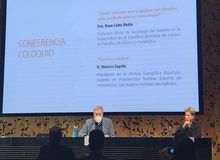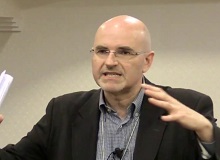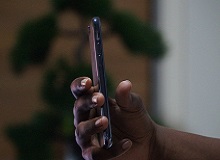


An event held in Madrid shows the successes of the Nordic model, which punishes the client, to curb trafficking and prostitution.

In an online event organised by the FOCL, the Italian evangelical theologian will address issues such as the doctrines of the Catholic Church and the influence of Pope Francis.

The songs of Spanish Christian singer Kike Pavón have over 200 million views on Youtube. In these times of pandemic, he encourages the youth to read the Bible more.

Women from a wide range of organisations and political views, including an evangelical pastor, explained the dangers of the 'trans draft law' at a round table organised by the Feminist Party.

Recent surveys confirm that an ever-increasing number of people under 23 identify as “non-binary”. Psychiatrist Glynn Harrison and theologian Olof Edsinger outline some of the causes behind the trend.

StopBettingAds.com encourages Christians to respond to a public consultation of the government, “explaining the damage that gambling related marketing has on communities across the UK”.

Psychologist Diane Langberg will address the theme “Redeeming power: understanding authority and abuse in the church” in an online event hosted by the Forum of Christian Leaders.

A report of the Spanish public TV shows the social action of evangelical associations during the pandemic. “We put the five loaves and two fish, and the Lord has multiplied them”.

According to a Gallup survey, 15,9% of Americans aged 19-24 identify themselves as LGBT. The poll also shows that among the general population, the figure reaches a record high (5,6%).

Ana María found the gospel through the website In Search of Jesus. Opportunities to share the gospel on the internet are multiplying, according to this online evangelism ministry.

The developers of the ‘Heroes 2’ video game app hope that it will be a tool to bring the message of Jesus to new generations.

A Pew Research survey shows that 47% of religiously unaffiliated adults have experienced any form of online harassment. It happens most among those under the age of 30.

A survey by Lifeway Research in the US concludes that “more of the conspiracy theories are traveling in politically conservative circles”.

“The way young people form bonds, make meaning, and live out their values is constantly changing. This is the most diverse generation that has ever existed”, concludes a survey conducted in the US.

Critics say the WEF's latest initiative is a threat to democracy. Economist Amar Breckenridge: “Unfortunately, evangelicalism has proven to be a fertile ground for such conspiratorial thinking”.

According to a Pew Research survey, young people tend to trust in others less. Italy has the highest rate of mistrust and Denmark the lowest.

Since March, the searches for words like fear, peace, hope and faith in Bible apps increased. “People are seeking God as they wrestle with what they faced in 2020”, You Version founder says.

The Spanish Evangelical Alliance publishes a report “to help churches reflect on the missionary challenges and possibilities of the new normality”.

There were 78 Jihadist attacks or attempted attacks in the EU between 2017 and 2019. “The biggest failure in Europe is the failed integration of Muslims”, the World Evangelical Alliance Director of Public Engagement says.

Olivier Giroud, David Luiz, Alisson Becker, Kevin Durant, among others, offered their jerseys. “260 million persecuted Christians is unacceptable”.

The Colombian Camilo Echeverry has become a phenomenon with his first album. “God is the pillar of my walk”, he says.

Minors 'must understand the consequences' before consent to treatment, says a landmark ruling. The country’s only gender clinic for children suspended new referrals for puberty blockers.

Jonathan Ebsworth of Tech Human shares practical tips. “Real embodied human relationships are messy and difficult, but it is where we can find true love and acceptance; even if the digital world feels more accepting”.

Entities and churches work tirelessly to take care of the most vulnerable during the Covid-19 crisis, often without the needed support of the authorities.

The Spanish Evangelical Alliance responds to the public consultation about the law stating that it ignores science and medicine and might "create a society with different levels of rights".

Las opiniones vertidas por nuestros colaboradores se realizan a nivel personal, pudiendo coincidir o no con la postura de la dirección de Protestante Digital.